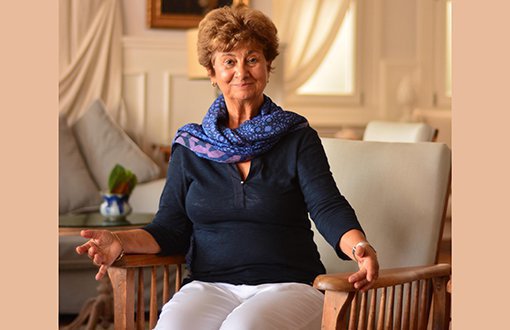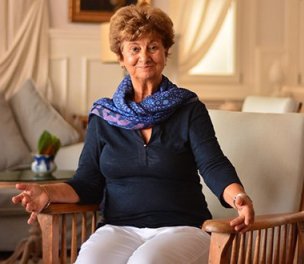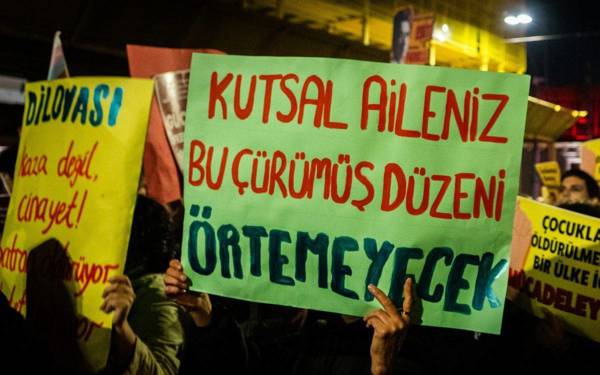* Photo: Coşan Göksel
Click to read the article in Turkish
"It is a preconceived opinion among the young generation that gender is a political issue. This is a nice achievement.
"Who reaches out to the women in the locals where we live and how? What services do they offer? They must reach out to the grassroots. Women's Platform for Equality (EŞİK) must take a picture of this.
"An army of volunteers must be formed to reach women.
"Men must also be included in the struggle. There has always been a resistance about this. But we need to form the broadest front possible to defend the İstanbul Convention.
"Similarly, differences of identity must be overcome. We need to form a much broader front where LGBTI+s are subjects."
It is Prof. Deniz Kandiyoti, who has been listing her recommendations to defend the İstanbul Convention, from which Turkey has withdrawn by the decision of President and ruling Justice and Development Party (AKP) Chair Recep Tayyip Erdoğan in March 2021.
Prof. Kandiyoti is one of the most important academics who have added the terms of "masculinist restoration" and "patriarchal bargain" to the terminology of gender, in addition to the concept of "gender crisis".
Working at the University of London as an Emeritus Professor now, Kandiyoti met with over 500 people in an online video conference held by the Women's Platform for Equality (EŞİK), which is an umbrella organization of over 340 LGBTI+ and women's organizations in Turkey.
Moderated by rights defender Prof. Sevgi Uçan, the conference started with a presentation held by Kandiyoti for nearly an hour and continued with a Q&A session. It soon turned into an exemplary meeting where opinions were exchanged about defending women's rights.
'Intensive efforts to obscure the Convention'
Some highlight from Kandiyoti's speech were as follows:
"I saw two defenses in the period of withdrawal from the İstanbul Convention. The first one was more oriented towards the domestic sphere in the sense that the dimension of violence against women was underlined and an action was taken to protect the existing rights.
"The second one was oriented towards the international sphere; there was evidence through the signatures put by the state under international conventions. As far as I saw, this first argument was intensively used by the legal professionals among you.
"Despite all these efforts, a huge amount of work began to obscure the convention. In fact, the full acceptance of this convention was based on some calculations out of pure pragmatism. If you especially remember the period when it was signed...
"In fact, the attacks on women's rights are not very independent of the attacks on women's rights in the world.
"There are two types of attacks on feminist struggle for rights. We can think of them as the attacks from the right and the left.
"There are certainly their equivalents in Turkey. They have exact equivalents in Turkey. Both discursively and situationally... I am talking about the anti-gender lobby that was shaped here in the 1990s.
"One branch of them is at the United Nations (UN). They are an entity of 126 states and coalitions that introduce themselves as family-friendly and are led by countries such as Vatican, Egypt and Qatar.
'Misogyny, homophobia lead to a terrible picture'
"Another branch is the right populist policies. We see its examples in several various countries such as Poland and Hungary.
"Another branch is the think-tanks and media organizations that are generously funded by the states, churches, companies and family businesses... When misogyny and homophobia politically supported from the bottom is added to this, it leads to a terrible picture.
"We know that the space occupied by the civil society organizations is now occupied by the state-guided civil society organizations. We know what they do. There are oscillations within this space as well. As in the case of the Women and Democracy Association (KADEM)...
"When it supported the İstanbul Convention, it was attacked. It tried to defend itself; this time, it entered the platform of family, attacking gays. At last, it has come to the point of 'We will handle it with our own laws.'
"In Afghanistan, women struggled very hard to be at the Parliament and they have won. They are very strong. Can you imagine it? Women can enter the Parliament there, but they cannot go from one province to another without being accompanied by a brother or father.
"The biggest shelter of the women there is the CEDAW and the international conventions signed by governments.
"The discourses used against the İstanbul Convention are quoted from these international discourses. They have, all of a sudden, brought up the issues of imperialism and national independence.
"It means that there are very negative conditions, both at home and abroad. There was a very serious basis in the 1990s, when women's rights advocacy was rising. There were very strong women working in the bureaucracy, academia, civil society and the media.
"Today, civil society is no more. The situation of the media is obvious. I think a new area must come up, something not done before must be done to defend the İstanbul Convention. What needs to be done?
"To begin with, we need to immediately get rid of the ones who try to bring the issues of gender to an issue of culture. Because this is not a cultural, but a gender issue, it requires a political struggle.
"Today, in the US, there is a very serious struggle about the interventions against one's body. There is an unbelievable anti-feminism and misogyny.
"Because an authoritarian regime has been rising there as well. This means the restriction of women's rights. Something similar is also the case in Turkey. This is not a culture war, but a political one.
'Patriarchy has come to an end'
"The traditional patriarchal system has ended. It does not mean that it is over now or it has been destroyed. It is in a weaker and more desperate situation and wants to restore itself; unfortunately, it needs violence more for this reason. There is this situation of masculinist restoration...
"I am hopeful, too... Hoping means winning..."
About Deniz Kandiyoti
Deniz Kandiyoti is an author and an academic of research in the fields of gender relations and developmental politics in the Middle East, specifically Turkey. She is currently a faculty member at the University of London. Kandiyoti worked at Middle East Technical University (METU) between 1969 and 1973 and at Boğaziçi University between 1974 and 1980. She holds a PhD from London School of Economics.
She has books titled, "Women and Rural Production Systems", "Women, Islam and the State" and "Gendering the Modern."
She was born on March 15, 1944. (EMK/SD)












